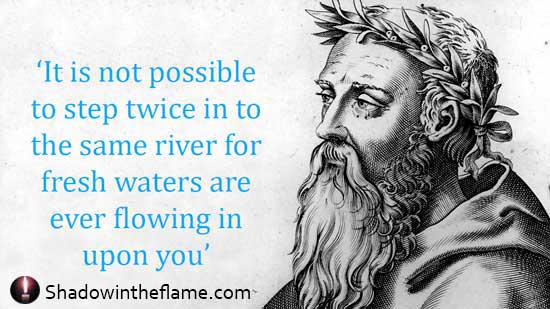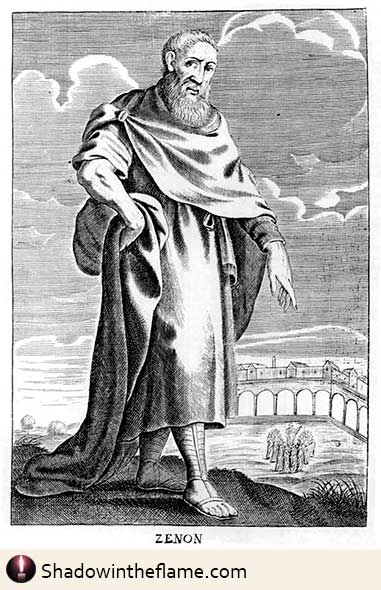
by Dwayne Schulz
1. Things and Events
The River of Change
The ancient Greek philosopher Heraclitus once famously remarked
‘It is not possible to step twice in to the same river for fresh waters are ever flowing in upon you’.
What he meant was that all things are in constant flux; just as a river consists of a flow-through of different waters, so everything else in the cosmos is in a state of perpetual change, of birth, growth, decay and death. This was summed up by a famous expression:
“panta rhei” attributed to Heraclitus meaning “everything flows”.
Zeno: There is No Such Thing as Change
 But other ancient Greeks like Zeno argued that change was impossible and thought up some of the most devious logical paradoxes to prove it. In one paradox Zeno asks us to imagine an arrow in flight. He considers the fact that the period during which the arrow is in flight consists of an infinite series of instants and argues that:
But other ancient Greeks like Zeno argued that change was impossible and thought up some of the most devious logical paradoxes to prove it. In one paradox Zeno asks us to imagine an arrow in flight. He considers the fact that the period during which the arrow is in flight consists of an infinite series of instants and argues that:
(1) At any given instant the arrow occupies a single space and no other, and
(2) During that instant the arrow is stationary.
‘How then’, Zeno asks, ‘if the arrow is stationary at every instant during its trajectory can it be said to have moved?’ Zeno concluded that motion and change were illusions masking a deeper unchanging reality below.
The paradoxical nature of change which so troubled Zeno can be illustrated with a other thought experiments.
Who Are You?
Consider the fact that every single molecule in the human body, every atom in every cell, is replaced by different ones every few years or so. How can you be the same person if, like Heraclitus’s river, the stuff of which you are made is constantly turning over and changing?
Plutarch’s Ship of Theseus
Plutarch looked at the same issue when he created a paradox we now call Plutarch’s mythical Ship of Theseus. In it he poses the following conundrum:
“If the old planks of the ship are replaced with new ones over the years but these old planks are then gradually re-assembled (as they come off the old ship) to ultimately form the original ship. Which is the true ship – the old new one or the new old one?”
A Loopy Puzzle
Finally, consider a simple loop in a piece of string. Let’s call the loop ‘A’ and the section of string it is made out of ‘B’. A and B constitute the same thing and are thus identical, or A=B. But move the loop down the string to another location.
Loop A is now composed of a different section of string, let’s call that ‘C’, now A=C. But pieces B and C are patently different, i.e. B≠C, and this results in a logical contradiction because A is equal to B and C which are unequal, or (A=B≠C=A) à (A≠A).
I hope to give you some convincing solutions to these paradoxes later in this article.
Being and Not Being
As bizarre as Zeno’s ideas were that change is unreal, the bias against change runs deep in the culture of Western civilization. Zeno in fact developed his paradoxes in support of his mentor Parmenides, the ‘father of logic’,’ who said in his poem The Way of Truth, that because change implied logical contradiction, being and not being, it was impossible.
“How could “what is” perish? How could it have come to be? For if it came into being, it is not; nor is it if ever it is going to be. Thus coming into being is extinguished, and destruction unknown. (B 8.20-22) “
2. Essence
 Plato
Plato
Parmenides and Zeno’s notion that change was impossible was taken up by Plato in his theory of Forms. He argued that the idea of change without “a real thing” simply led to confusion. In his book Cratylus, Plato argues in support of Parmenides and Zeno that below the world of apparent change is a world of timeless unchanging essences which are templates for ordinary objects on earth, for example, that for each actual horse there exists somewhere a perfect ‘Horse Form’ of which real horses are but imperfect imitations.
Plato has Socrates say:
How can that be a real thing which is never in the same state?
…knowledge too cannot continue to be knowledge unless continuing always to abide and to exist, and if the transition is always going on there will always be no knowledge and according to this view there will be no one to know and nothing to be known.
The Prima Mobile
Everyday thought and language seem to support Plato’s notion that somehow an unchanging essence must underpin or ground apparent change. We tend to speak about ordinary objects being subjected to accidental variations or changes of form. Objects have properties and events happen to them. For example, in declarative sentences like “John is sick” or “My car was in a smash” or “Venus is in orbit”, we tend to think of the predicates ‘being sick, ‘being in a smash’ and ‘being in orbit’ as incidental properties or states that the objects (John, My car and Venus) are subjected to. This manner of thinking lends itself to a model of change in which the subject is static and change is inessential, occurring as an external force.
This object-property model was formalised by Aristotle who argued that all things were a combination of matter and form, a theory called hylomorphism. In Aristotle’s theory matter was a passive substance or ‘patient’ which changed when acted upon by an external force or ‘agent’ which gave it form. Ultimately all effects in Aristotle’s schema could be traced back to some original First Cause or God which he called the Prima Mobile or Prime Mover.
The idea of substance or matter deriving its form from some external agent of change was adopted by medieval theologians like Aquinas who used it in support of the Church doctrine that the body’s soul derived from God. The substance-form distinction also informed modern mechanical theories espoused by people like Descartes and Newton who disagreed with Aristotle’s physics but retained the idea that “modes [properties] cannot be clearly conceived apart from the really distinct substances of which they are the modes”
For Descartes, all the properties of nature could be reduced to the quantitative (mathematical and measurable) movements of matter whose fundamental property was extension in space or res extensa. Scientists like Newton and Boyle agreed with Descartes’ principle interpreting it in atomistic terms (contra Descartes who subscribed to something like an ether theory), arguing that nature was nothing but arrangements of impenetrable ‘corpuscles’ within the void of space.
Is the Future Predictable?
The mechanistic idea left little or no place for real chance or novelty in the world. Effects were totally determined by their causes and if you only had enough information and processing power, you could predict with total precision all future change in what they saw as a clockwork universe. Newton’s contemporary the French mathematician and astronomer Laplace summed up the mechanistic attitude when he said,
[For] an intellect which at a certain moment would know all forces that set nature in motion, and all positions of all items of which nature is composed, … nothing would be uncertain and the future just like the past would be present before its eyes.
Hegel’s World Spirit
 German Philosopher Hegel
German Philosopher Hegel
The first philosopher of modern times to revive Heraclitus’s idea of panta rhei and to mount a systematic critique of the mechanists was the early 19th Century German philosopher Hegel. Hegel too argued that Becoming or change was fundamental. However, for him change as it manifested itself in nature and history revealed the story of an inner essence he called the ‘World Spirit’ or the Absolute gradually unfolding itself through a process he called ‘the dialectic’ (i.e. the clash of binary opposites. in war, politics and science) culminating in a state of perfect freedom and unity with God.
In my opinion Hegel’s Absolute plays the same role as Substance in the philosophy of the mechanists, and his dialectic is just as deterministic, proceeding as it does along a singular narrow path towards a pre-determined end.
Hegel’s dialectic constricts the scope of change choking the multiple and diverse alternatives that history can take. I will return to this idea soon but the same criticism can be applied to all theories of history and change which tell a story of uni-linear progress.
For example 19th Century anthropologist Henry Morgan asserted that humankind progressed through a series of stages from “savagery” through “barbarism” to reach its apogee in “civilization”. Marx also adopted this view arguing that history progressed from the primitive tribalism via class society and ultimately to communism.
Modern right-wing commentators like Francis Fukuyama also adopt this view when they say that free-market liberalism represents the “end of history”. Such views pretend to be a philosophy of change but at the end of the day preach different versions of mechanism, in which change proceeds towards some pre-figured image in an isomorphic*1 movement from same to same, where there really is nothing new under the sun.
(*1 – Isomorphic = having similar appearance but genetically different)
However, the idea that there is more to change than the expression of unchanging essences, principles or substances, the idea that that the cosmos is animated by a kind of change which is more unpredictable, diverse and creative has persisted through the ages. To my mind the first modern thinker who really put this kind of change at the centre of their philosophy was the French intellectual Henri Bergson.

